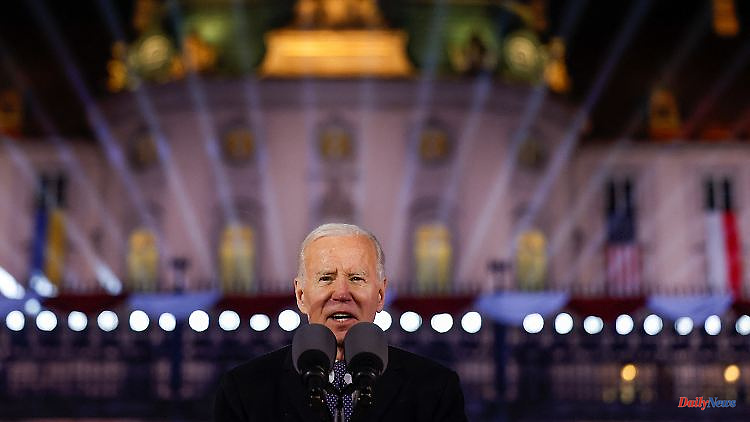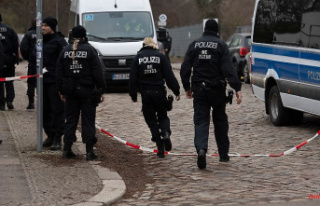US President Biden meets in Warsaw with the heads of state of the so-called Bucharest Group, an association of Eastern European NATO countries. Here it becomes clear how much the power structures in NATO and the EU have shifted towards the east.
When it comes to Joe Biden's current visit to Poland, one word usually comes up: historical. In fact, this description is not an exaggeration. There has never been a US President who has visited the country on the Vistula twice within twelve months and given a public speech there. By the way: Biden has not yet completed a state visit to Germany.
However, the fact that this is the case does not mean that there have long been particularly close ties between the Biden administration and the national-conservative government in Warsaw. On the contrary: in 2020, pro-government media in Poland were still passing on the Trump fairy tale of the falsified presidential elections, because they and national conservative politicians in Poland made no secret of their sympathies for the Republican. At the time, Poland's President Andrzej Duda even managed the feat of congratulating Putin as one of the last Biden on his election.
As late as 2021, Washington is said to have threatened the Polish government with sanctions because the national conservative governing party PiS wanted to silence the private television station TVN, which they hate, with a controversial media law. This has belonged to the US media group Discovery for several years. In his speech on Tuesday, Biden called Poland "one of the greatest partners".
This speech and Biden's visit as a whole show how the Russian war of aggression in Ukraine, which began a year ago, has shifted the power structures within NATO and the European Union to the east. That's not surprising. As a result of the war, Poland, the Czech Republic, Slovakia and the three Baltic states of Lithuania, Latvia and Estonia became frontline states of the transatlantic defense alliance because of their proximity or even direct neighborhood to Ukraine and Russia. Poland not only plays a particularly important role in receiving and distributing Ukrainian refugees, but is also a hub for military and humanitarian aid from the West.
All of these are states that are even more concerned about their own security as a result of the Russian war in Ukraine. This not only explains why Lithuania, Latvia, Estonia and Poland are among the four largest supporters of Ukraine in terms of gross national product according to the "Ukraine Support Tracker" of the Kiel Institute for the World Economy, it also explains the increased defense spending of these countries. Poland's Prime Minister Mateusz Morawiecki recently announced that this year's defense budget would be increased to four percent of gross national product. Even the original defense budget for 2023 was three percent of GDP higher than that of the Federal Republic.
This defense spending says a lot about the relationship between the Eastern NATO and EU partners and Germany and other Western European countries. The turning point announced by Chancellor Olaf Scholz was welcomed from Warsaw to Tallinn. But the fact that it is now sluggish makes for disappointment. After the experiences of the past few years, when Germany stuck to Nord Stream 2 despite all warnings from Central and Eastern Europe, this is just another example for the Eastern European governments that you cannot rely on Germany, but also on France, in terms of security policy.
As a result, East-Central Europeans are even more focused on the US, which already has troops stationed in the region. Already on Tuesday, President Duda called for "more America in Europe" and announced that the aim of Poland's EU Council Presidency, which the country will have in 2025, should be to deepen transatlantic cooperation.
A basic statement that also dominated today's meeting between Biden and the Bucharest group in Warsaw. Romanian President Klaus Johannis explained that Biden's presence not only underscores the security of NATO's eastern flank. "It also includes an increased military presence. This must be continued and also includes the preparation of an American strategy for the Black Sea region," said Johannis at the meeting attended by the presidents of Poland, the Czech Republic, Slovakia and the three Baltic states , Hungary and Bulgaria participated. "Mr President, your presence is further proof that transatlantic cooperation is closer than ever before," Slovak President Zuzana Čaputová said to Biden. This in turn described Article 5 of NATO, which describes the case of the alliance, as "sacred and inviolable".
A participant in the Bucharest group's meeting with Biden was Moldova's President Maia Sandu. A clear signal to Russia, which Sandu accuses of having planned a coup in her country. Clear words were also spoken about the Ukraine. At the meeting, all support was not only assured until their victory over Russia, but Biden also advocated a transatlantic perspective for the country. For the East Central Europeans, this is a guarantee for long-term peace in the region.












